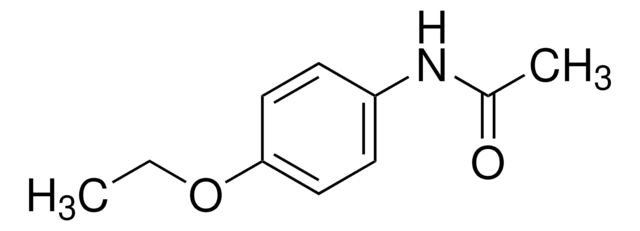PHR1095
Caffeine Melting Point Standard
Pharmaceutical Secondary Standard; Certified Reference Material
Synonym(s):
Caffeine, 1,3,7-Trimethylxanthine
About This Item
Recommended Products
grade
certified reference material
pharmaceutical secondary standard
Quality Level
Agency
traceable to USP 1086006
API family
caffeine
CofA
current certificate can be downloaded
technique(s)
HPLC: suitable
gas chromatography (GC): suitable
mp
~Approximately 237 °C
234-236.5 °C (lit.)
application(s)
pharmaceutical (small molecule)
format
neat
storage temp.
2-30°C
SMILES string
CN1C(=O)N(C)c2ncn(C)c2C1=O
InChI
1S/C8H10N4O2/c1-10-4-9-6-5(10)7(13)12(3)8(14)11(6)2/h4H,1-3H3
InChI key
RYYVLZVUVIJVGH-UHFFFAOYSA-N
Gene Information
human ... ADORA1(134) , ADORA2A(135) , ADORA2B(136) , ADORA3(140)
Looking for similar products? Visit Product Comparison Guide
General description
Caffeine is mainly used as a diuretic and as a stimulant to central nervous system, heart rate, and respiration.
Application
Analysis Note
Other Notes
Footnote
Recommended products
related product
Signal Word
Warning
Hazard Statements
Precautionary Statements
Hazard Classifications
Acute Tox. 4 Oral
Storage Class Code
11 - Combustible Solids
WGK
WGK 1
Choose from one of the most recent versions:
Already Own This Product?
Find documentation for the products that you have recently purchased in the Document Library.
Customers Also Viewed
Our team of scientists has experience in all areas of research including Life Science, Material Science, Chemical Synthesis, Chromatography, Analytical and many others.
Contact Technical Service





